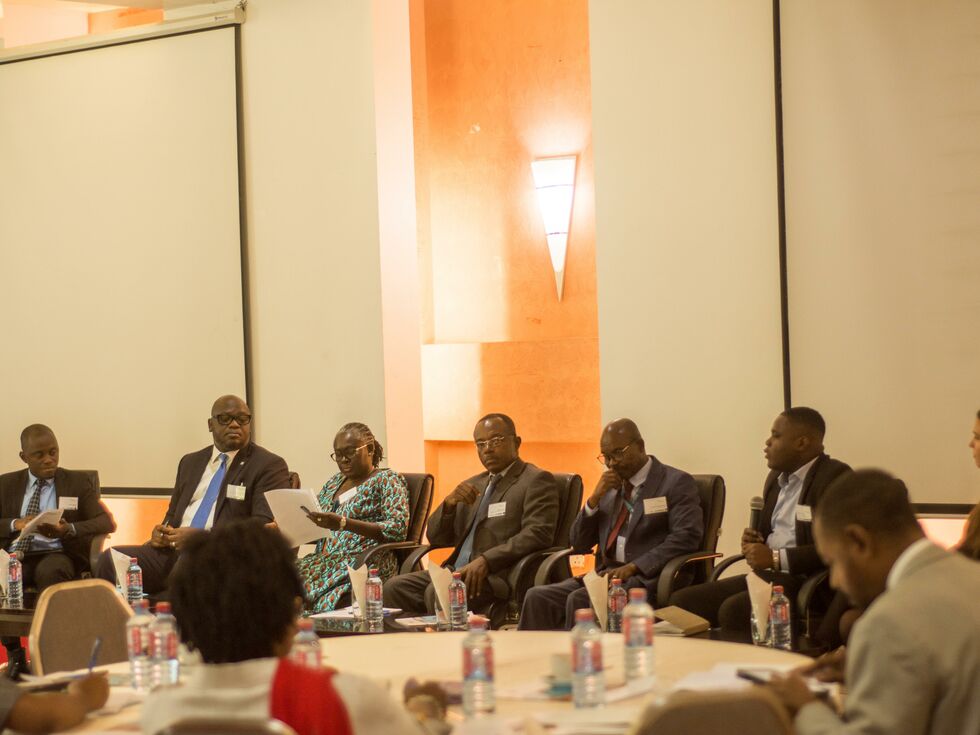Private Sector calls for a united front to win the fight against corruption
10.12.2019
Accra, Ghana


A high-level panel of stakeholders in the private sector and civil society organizations have called on the private sector to champion collective action, through collaborations and presenting a united front in order to win the fight against corruption, especially in the light of the implementation of the Africa Continental Free Trade Area (AfCFTA).
The call was made at the Business Integrity Forum dubbed “Positioning for the AfCFTA and the fight against corruption: the critical role of the Ghanaian Private Sector” organised by the Alliance for Integrity, the Private Enterprises Federation (PEF) and the Ghana Anti-Corruption (GACC) in collaboration with the UK Ghana Chamber of Commerce (UKGCC), American Chamber of Commerce, Ghana (AMCHAM), Ghanaian-German Economic Association (GGEA), Palladium and the UN Global Compact Network.
In her welcome address, Ronke Ampiah, Advisory Group Chair of Alliance for Integrity Ghana, highlighted the need for open discussions among private sector actors on the challenges and obstacles they face in doing business. She advocated for active peer-to-peer engagements and learning from best-practices around the world, especially on how to harness the full benefits of cross border trade while mitigating the risks of corruption. She also stressed on the need for collective action of public sector, private sector and civil society in the fight against corruption.
Setting the tone for the discussions, Nana Osei Bonsu, Executive Director, Private Enterprises Federation & Chairman, Ghana Anti-Corruption Coalition, underscored the business and investment opportunities that the African Continental Free Trade Area (AfCFTA) holds for the private sector. Yet, he also emphasized the attendant challenges of a liberalized market, including the apparent connection between trade and corruption. He noted that the private sector should not neglect the discussions on the operationalization of the CFTA to only the government but actively engage in its set-up by presenting a common front to government, which should outline what the private sector needs to gain from the CFTA and prevent corruption. He therefore encouraged the private sector, especially the SMEs who make up about 90% of businesses in Ghana, to join relevant sector associations, forge partnerships and build enough capacity to be able to withstand the shocks from the eventual implementation of the CFTA. He used the opportunity to encourage the Ghanaian Parliament to speed up the passage of the Insolvency Bill so that struggling SMEs can survive bankruptcy and be able to participate in the CFTA. Nana Osei Bonsu emphasized the need for collaboration within the private sector to have a competitive advantage in trading in the light of the CFTA and in fighting against corruption.
In a panel discussion on “Private sector role in fight against corruption’” panelists stressed on the need for private sector collaboration to put pressure on government to drive the full implementation on the National Anti-Corruption Action Plan (NACAP) and the enforcement of all legislations on anti-corruption. The discussants laid emphasis also on collaboration in data collection as regards to corruption and the use of the data to build capacity or prosecute where necessary to serve as deterrent. The issue about the cost of fighting corruption featured prominently and the consensus was reached on the need for collective action and a new bold step that departs from mere rhetoric to evidence-based action and agenda at industry, association and chamber levels against corruption.
Participants of the Business Integrity Forum included top-level executives from private sector entities, public sector institutions, civil society organisations and international agencies. Panellists of the discussions included, Simon Madjie, Executive Secretary – American Chamber of Commerce, Ghana; N. Adjoba Kyiamah, Executive Director – UK Ghana Chamber of Commerce; Stephen Antwi, President – Ghanaian-German Economic Association; Solomon Tettey-Akpeng, Governing Board Member – UN Global Compact Network; Bright Sowu, Deputy Director – Ghana Anti-Corruption Coalition and Dr. Ingrida Kerusauskaite, Portfolio Lead, Anti-Corruption and Illicit Financial Flows – Palladium/MoDAC.
Author: Gideon Mankralo, Network Manager Ghana, Alliance for Integrity





